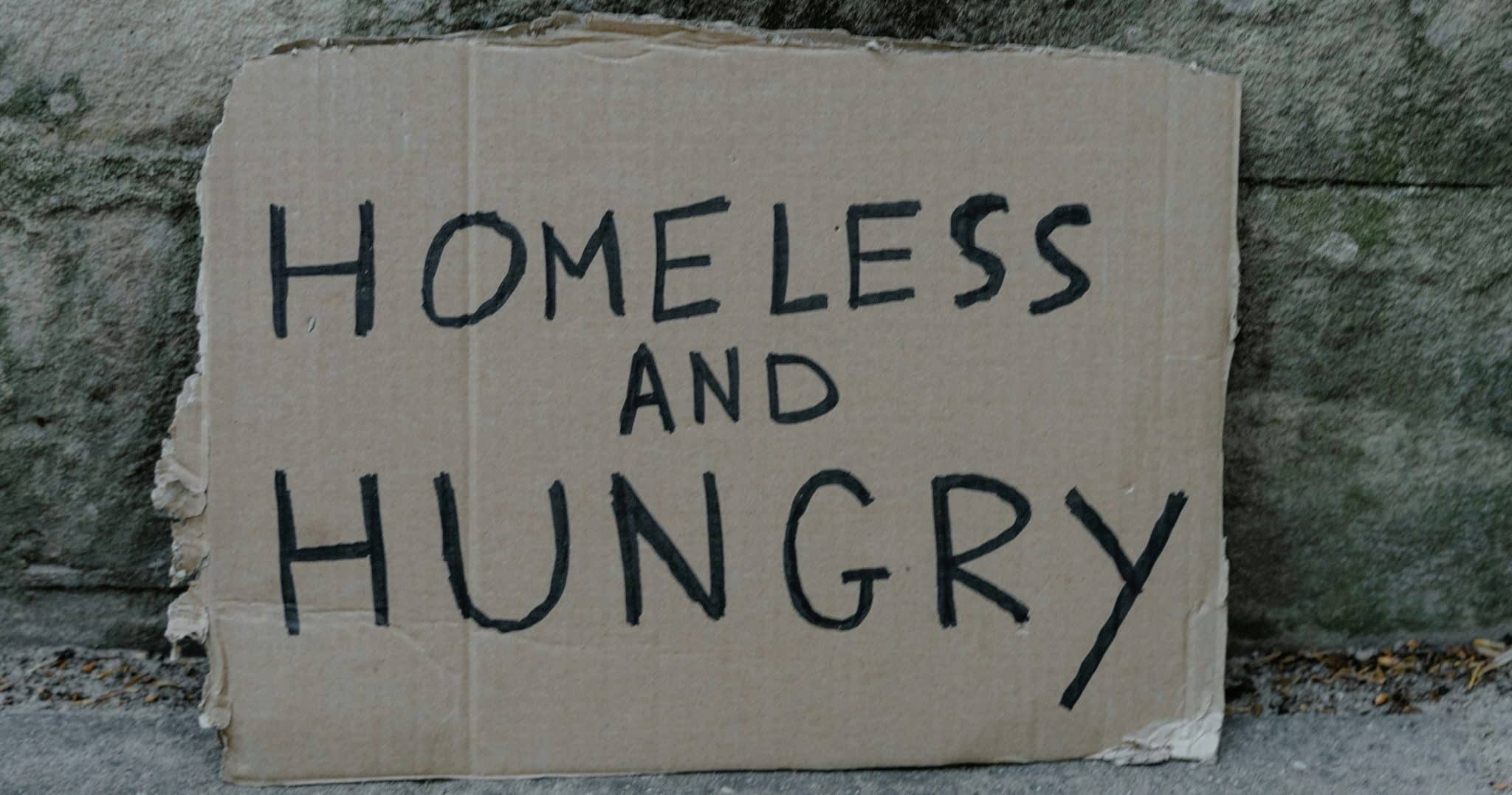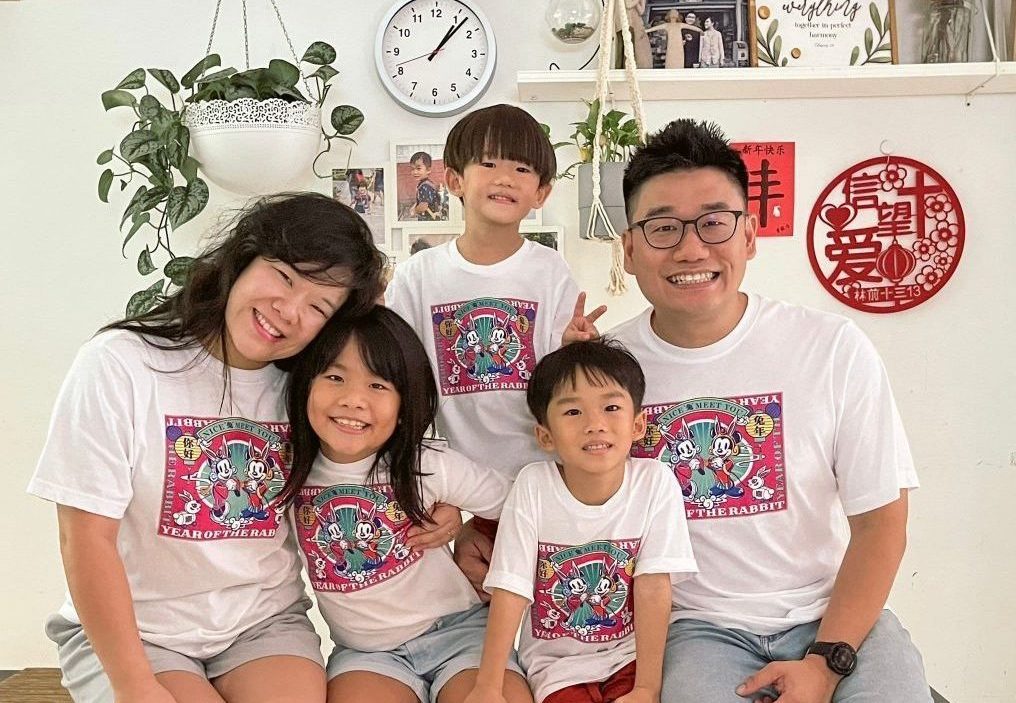Good people are needed in government: Basuki (Ahok) Tjahaja Purnama on good governance and battling corruption
In this series on The Gatekeepers Dialogue, Salt&Light interviews leaders who provide a biblical worldview of global issues that will be highlighted at the next World Economic Forum.
by Janice Tai // August 19, 2021, 5:15 pm
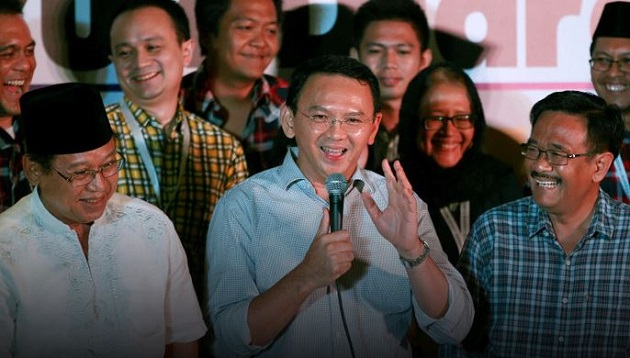
Basuki "Ahok" Tjahaja Purnama addresses the media on April 19 after conceding defeat in the 2017 Jakarta election. Picture from Reuters.
On the 14th day of serving his two-year sentence in prison in 2017, former Governor of Jakarta, Basuki Tjahaja Purnama (more popularly known as Ahok), found himself awake at 2am, unable to fall back to sleep.
He felt like he was having a heart attack, with his head burning hot and his heart feeling extremely heavy.
Fearing that his heart was acting up, he called out to the guard outside: “Help me! Help me!”
Alarmed, the guard asked him what was going on. Mr Basuki explained to him his symptoms but the guard promptly brushed his concerns away.
“Oh, don’t worry, it’s quite common and usual. Many people who come in here also feel like that,” the guard replied.
Seeing that Mr Basuki was still in a stressed state, the guard suggested that he could try coming out into an area with a more open space to take a short walk or run.
“That’s a good idea, maybe I am feeling this way because this space is too small,” said Mr Basuki.
“If you do not forgive, it will ruin your soul and body. Just let God be the judge.”
Yet as he stepped out, his mind continued churning.
“There are at least 60 guards here clad in full armour. What if any of them who have turned radical suddenly decide to shoot me?” he wondered.
So barely a few moments after he had stepped out of his cell, he decided to return to it for safety’s sake.
“God, what is happening to me? Why is my soul full of anxiety?” Mr Basuki asked, praying.
In that moment, he received the answer.
“God showed me that I was angry, that I wanted vengeance. Hatred consumed my body because I felt betrayed by people and I felt abandoned,” said Mr Basuki, who is known for battling corruption and improving healthcare when he was Governor of Indonesia’s capital city between 2014 and 2017. He is a Christian and was Jakarta’s first non-Muslim Governor in 50 years.
As he prayed, Mr Basuki pictured the Cross and the divine exchange that occurred on it.
“As you have forgiven me, help me, Holy Spirit, to forgive them,” he said in response. At 4am, he fell into a deep sleep. When he woke up, he felt much lighter, as though a huge burden had been lifted off him.
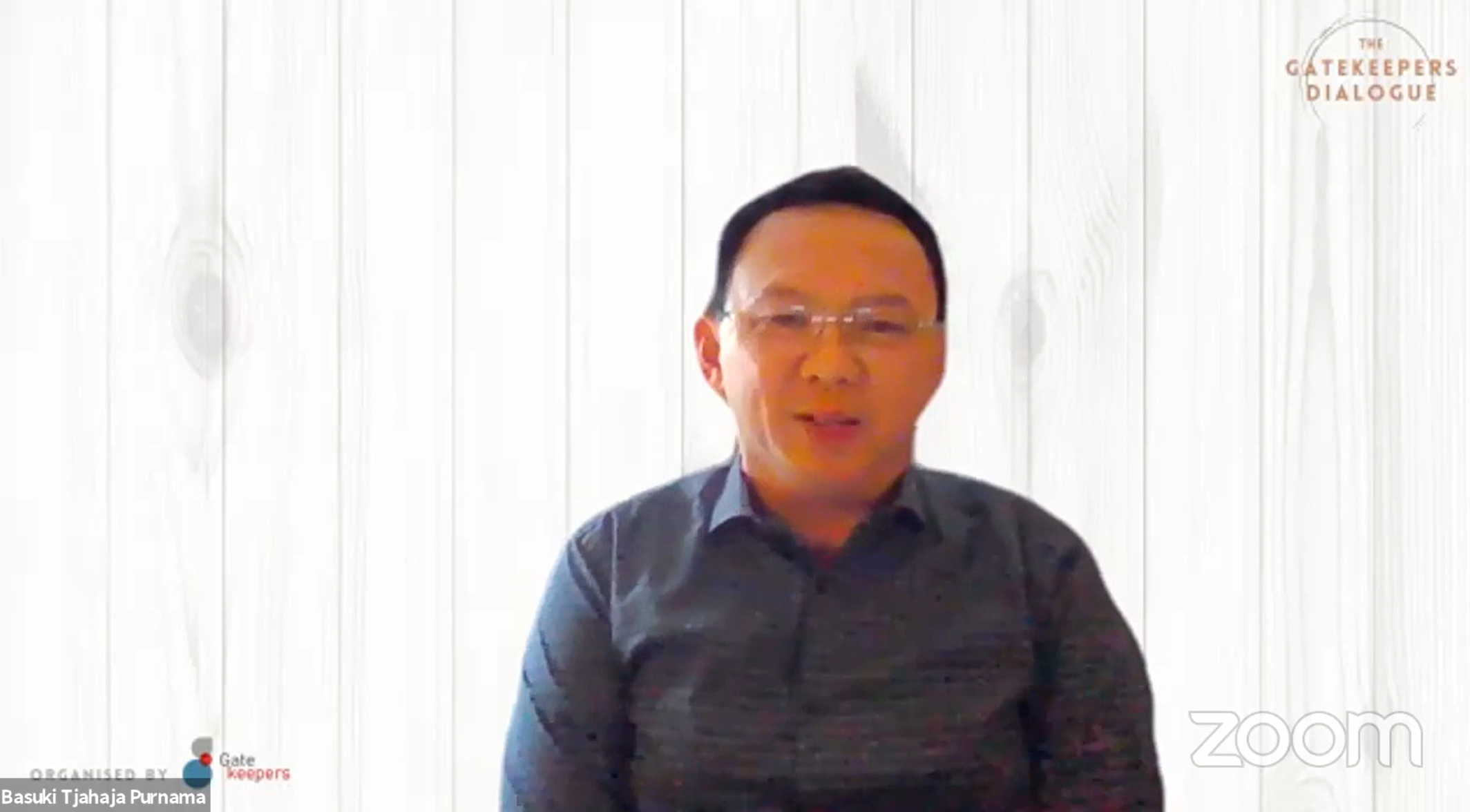
Mr Basuki giving a talk on good governance as part of The Gatekeepers Dialogue. He was the first ethnic Chinese Christian to run the nation’s capital.
In 2017, a Jakarta court had sentenced Mr Basuki, a protege of President Joko Widodo, to two years’ jail after finding him guilty of blasphemy, a verdict widely seen as stemming from political pressure by conservative groups.
His guilty verdict and sentence of two years’ jail was over a speech he gave in 2016. An edited video of his comments went viral, sparking demonstrations that ultimately led to his being brought to trial while he campaigned in city elections. Mr Basuki’s sentencing was widely condemned by the international community who saw him as being politically targeted.
Speaking on August 13 at The Gatekeepers Dialogue, an online conference organised by Gatekeepers (Singapore), Mr Basuki, who is now President Commissioner of Pertamina, discussed governance and government. In the Old Testament, good governance is expressed in terms of right relationships between the ruler and the people, and between the ruler and God. There are also stories of when this relationship of trust is broken.
Mr Basuki recalled that evening in jail in response to a question from a member of the audience: Has he been able to forgive the people that levelled the accusations against him?
“If you do not forgive, it will ruin your soul and body. Just let God be the judge,” replied Mr Basuki, who named his fourth child “Yosafat” after King Jehoshaphat in the Bible, who had deferred to God’s justice and continued to sing praises to God even in the face of powerful enemies.
Establishing sound governance
As the former Governor of Jakarta in Indonesia, Mr Basuki shared his experience of establishing good governance as he battled corruption and improved healthcare and education. Under his leadership, the city administration had the most transparent annual spending budget system.
One of the key legacies of Mr Basuki’s leadership was in implementing Smart Jakarta Card programme, a government aid programme for underprivileged students that waives the school fees of elementary, junior and high-school students from poor families. In 2013, there were 390,000 recipients. In 2016, this number increased to 750,000, with the programme’s budget increasing in tandem to a total of IDR2.5 trillion (S$264.6 million).
“If good people don’t want to get involved in institutions like the government, then we don’t have hope for the poor and the needy.”
Under Mr Basuki’s watch, Jakarta’s unemployment rate decreased from 9.84% in 2014 to 5.44% in 2016. Poverty decreased from 3.92% in 2014 to 3.75% in 2016, with local economic growth.
The provincial government also built thousands of state-subsidised rental flat units to house the poor and underprivileged, many of whom previously lived in dense riverside slums.
“The best place to help the poor and needy is to be in the government, because then you get the budget to do things and you can transform the culture and attitudes of public servants.
“We stand for justice, truth and honesty and I get illumination about all these from the Bible,” said Mr Basuki.
“If people have a calling, I would like them to be politicians. If good people don’t want to get involved in institutions like the government, then we don’t have hope for the poor and the needy. It says in Proverbs that evil men do not understand justice,” he added.
Brushes with corruption
These are values that may be hard to stand by in a country notorious for widespread corruption. According to the Indonesia Corruption Watch, there have been over 250 members and former members of parliament named suspects in graft cases over the past five years.
“We stand for justice, truth and honesty and I get illumination about all these from the Bible.”
How, then, can one do business without bribery, or follow God’s guidance to be “as wise as serpents, yet as innocent as doves” in such an environment, a member of the audience asked Mr Basuki.
In response, Mr Basuki recounted his own brushes with corruption during his time as a businessman, before he became a politician.
Back then, he was a geologist and had also developed his own gravel sand products to supply to oil companies.
“I have never imagined that today I could be the chairman of an oil and gas company,” said Mr Basuki. After he was released from jail in 2019, the State-Owned Enterprises Ministry appointed him as the President Commissioner of Pertamina, Indonesia’s largest company and its single most important state-owned enterprise.
When he was a businessman, the oil company to which he supplied his products asked for a fee of $2 for every small bag of product that they bought from him.
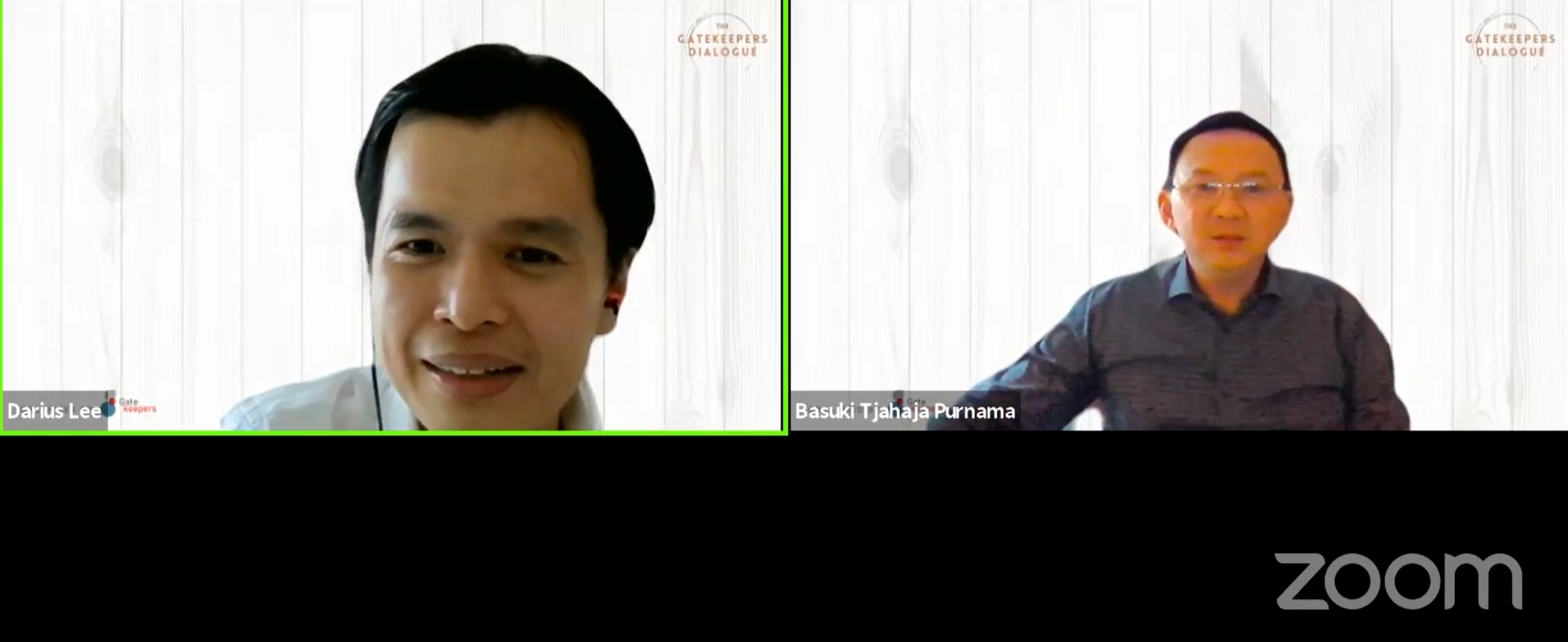
Mr Basuki fielding some tough questions from the audience through moderator of the talk, lawyer Darius Lee.
“I struggled over this a lot as a Christian and I find that the most important thing we can do in such situations is to seek God and talk to Him about it,” said Mr Basuki.
“You don’t need to worry about what’s right or wrong or what people think of you, just do what God tells you and get your illumination from His Word.”
In the end, he decided to stop paying the company any fees. As a result, his factory was found to have failed some inspections later on and he could no longer sell his products.
“I didn’t know what to do then. I needed to keep selling the products as I had so many employees under me,” said Mr Basuki.
“I prayed and knew that God wanted me to be a light in the government. I wondered why I wasn’t called to be a pastor or preacher.”
He spoke frankly to his employees, asking them to choose between taking a layoff package and leaving the company, or sticking it out with the business until all the funds ran out.
The employees told Mr Basuki that they believed in him and would follow him.
For one whole year, the factory had no sales. Mr Basuki had to rent a 10,000 sqm warehouse to store all the unsold products. Eventually, the factory closed down. Its staff continued to take their company keys back home, hoping that one day they would be able to return to work.
Then, a turning point came.
The sector suddenly needed a product that he had that could not be found elsewhere. Shipping it from the United States would take some three to six months but the companies needed it urgently. So, they had to buy it from Mr Basuki at a higher price due to the ongoing demand.
In the end, the company made a fair bit of money from these business contracts.
“When we depended on our own money and made our own decisions, the factory had to close. But God later helped me with these decisions and He made a way for me,” said Mr Basuki, who then presumed that he could help the poor and needy by being a businessman of a big conglomerate.
But God had other plans.
A lamp unto his path
“I prayed and knew that God wanted me to be a light in the government. I wondered why I wasn’t called to be a pastor or preacher,” he said.
As a politician, Mr Basuki continued to turn to God’s Word to guide him in life.
Inscribed at the back of his iPad is Hebrew 13: 6: “The Lord is my helper; I will not be afraid. What can mere mortals do to me?”
Placed strategically on his desk is this verse in Indonesian: “The Lord is my light and my salvation – whom shall I fear? The Lord is the stronghold of my life – of whom shall I be afraid?” (Psalm 27: 1)
Inscribed at the back of his iPad is Hebrew 13: 6: “The Lord is my helper; I will not be afraid. What can mere mortals do to me?”
Many have warned him to be careful as he could be making for himself many enemies in his fight against systemic corruption.
“People can shoot and kill me anytime. The police offered me 18 bodyguards to follow me around, but I don’t like it. I just need a driver. They gave me two guns, but there is not much point in having them because if they shoot me and I shoot them back, we will all still die,” said Mr Basuki.
“What will happen to me after I retire? I have become like an enemy to government officers whose salaries are very low. Businessmen are also afraid to invite me to their companies,” he added.
To keep himself fighting the good fight and finishing the race of life well, Mr Basuki makes time to gather with a small group of friends every Saturday.
“We spend one-and-a-half hours sharing, praying, and keeping watch. We don’t want our worries about the future or the fear of having too many enemies lead us to make any compromise in our lives,” said Mr Basuki.
He lives by four principles in his life: His belief in God’s providential control in his life, that he is chosen by God to carry out His purposes, therefore he has nothing to fear, and that all his needs will be provided for.
“As humans, our emotions go up and down but God has given us the Holy Spirit to remind us that we are not alone in any circumstances. Talk to Him, trust Him and be thankful always.”
MORE FROM THE GATEKEEPER’S DIALOGUE:
We are an independent, non-profit organisation that relies on the generosity of our readers, such as yourself, to continue serving the kingdom. Every dollar donated goes directly back into our editorial coverage.
Would you consider partnering with us in our kingdom work by supporting us financially, either as a one-off donation, or a recurring pledge?
Support Salt&Light
